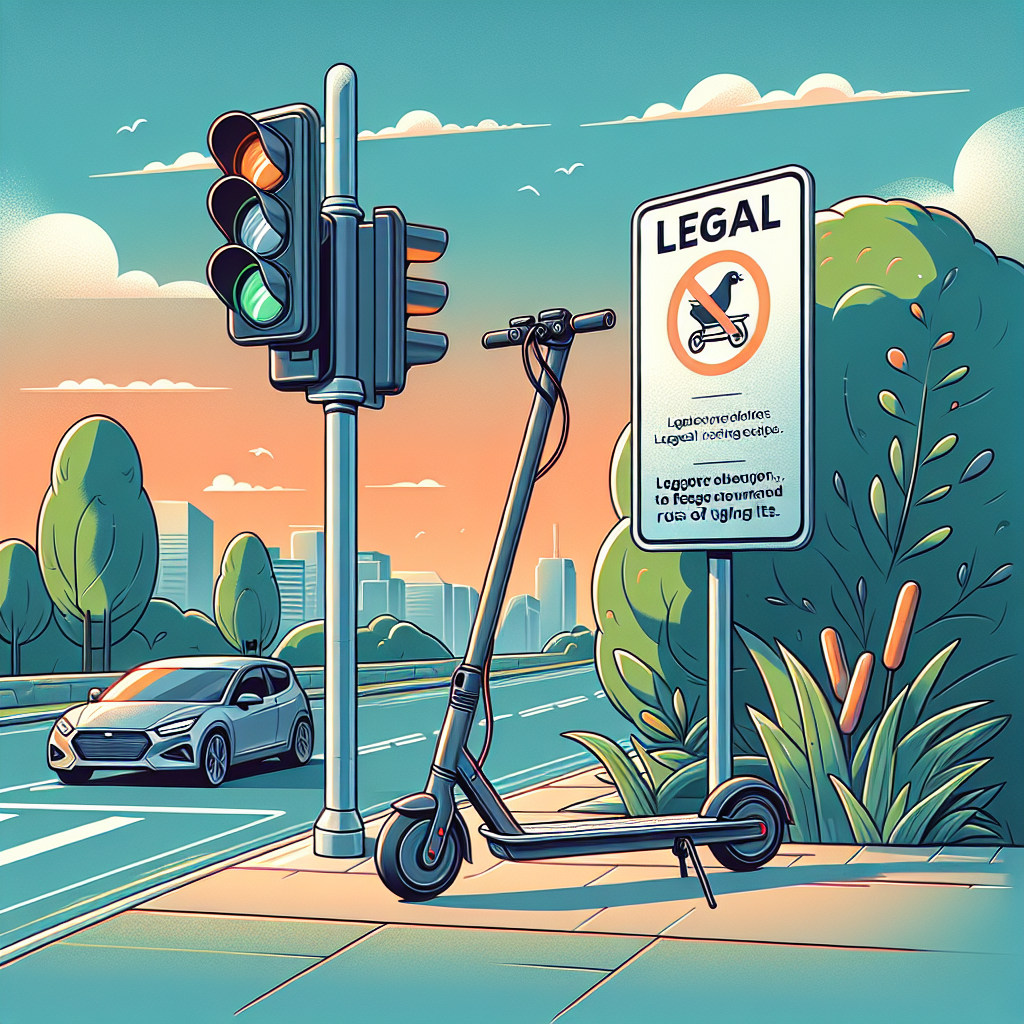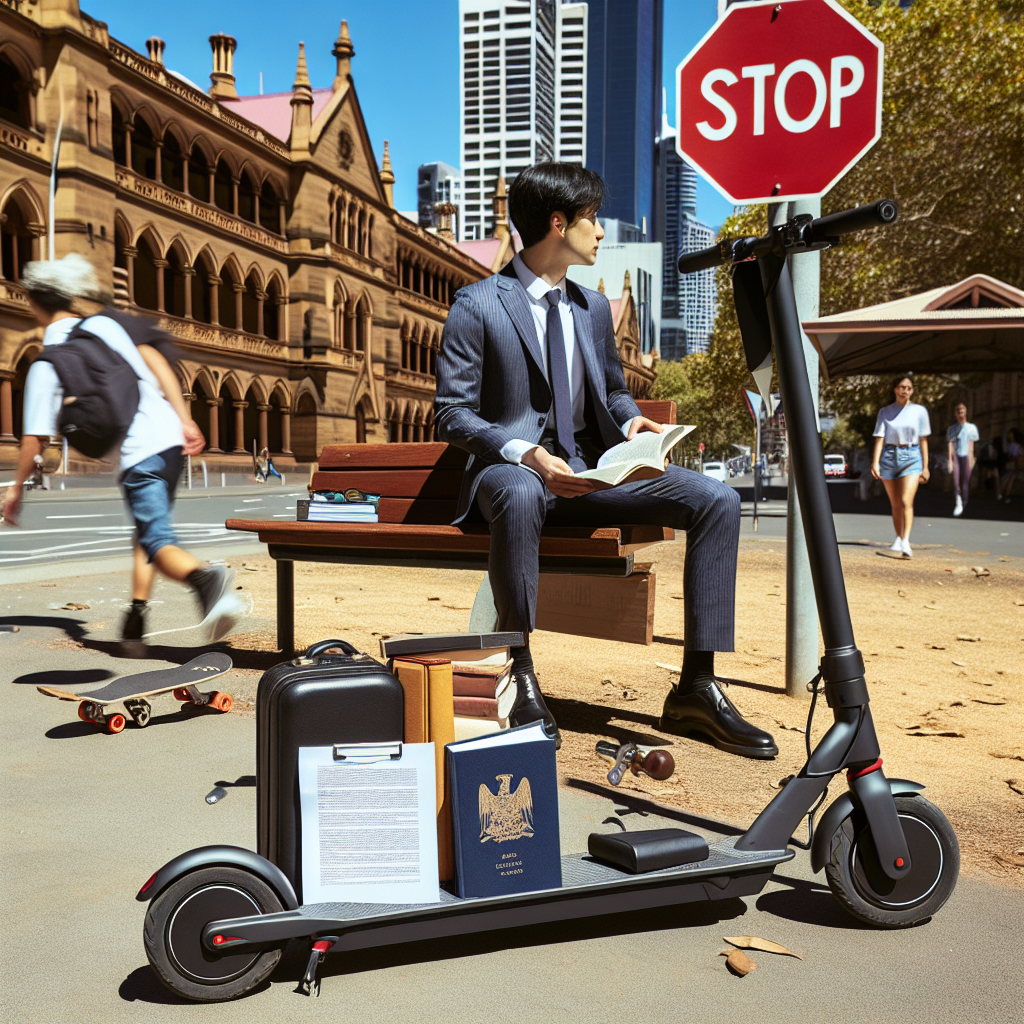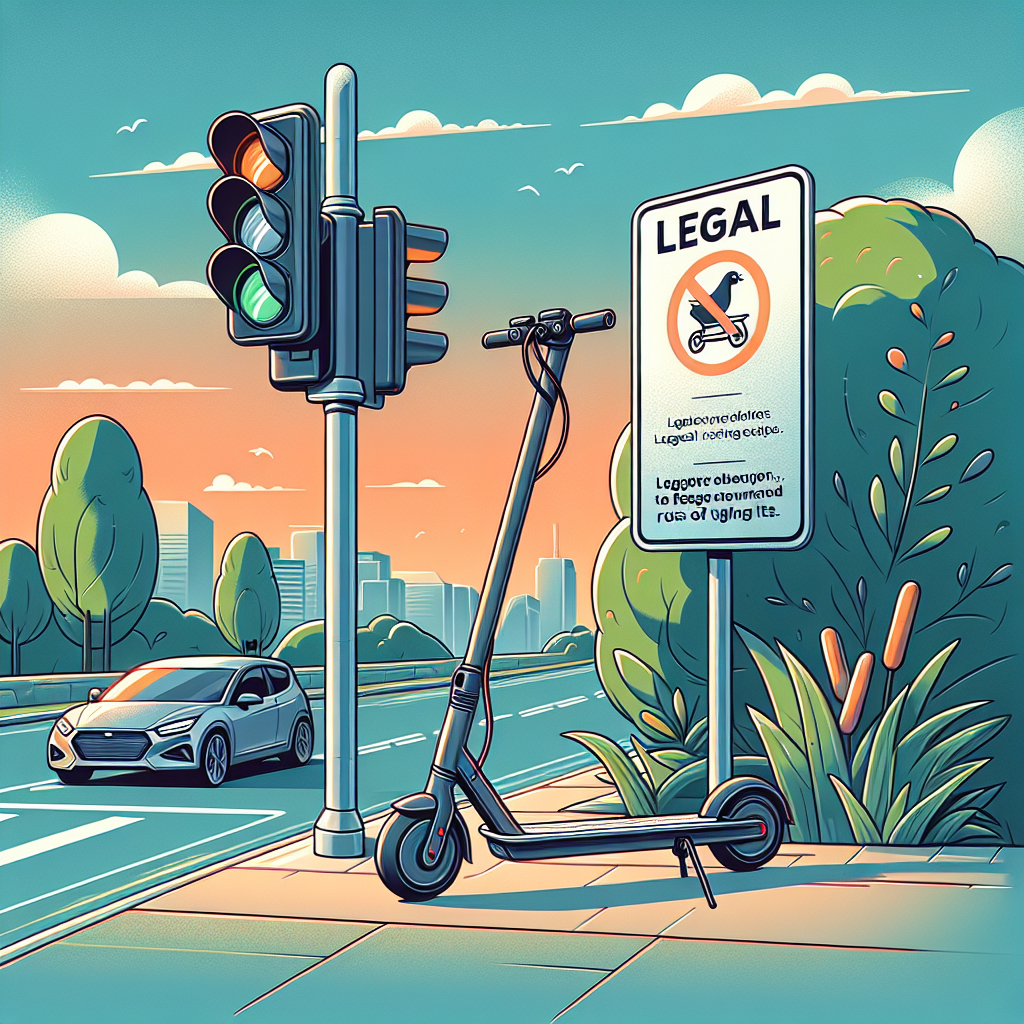Have you ever seen people zipping by on electric scooters and wondered if they are actually legal? Well, if you’re in New South Wales (NSW), Australia, you might be surprised by the answer. Electric scooters, also known as e-scooters, have become increasingly popular in recent years, offering a convenient and eco-friendly mode of transportation. However, the legality of these scooters varies from one place to another. So, let’s find out if electric scooters are legal in NSW and what rules and regulations you need to be aware of.

Overview of Electric Scooters
Electric scooters are lightweight, motorized vehicles that are gaining immense popularity worldwide. They provide an eco-friendly and convenient mode of transportation for short distances. With their compact design and electric-powered engines, electric scooters have become a popular choice for urban commuters, students, and those who are looking for a cost-effective and efficient way to navigate through busy city streets.
Definition of Electric Scooters
Electric scooters, often referred to as e-scooters, are personal mobility devices that are propelled by an electric motor. These scooters typically have two wheels, handlebars for steering, and a platform where the rider can stand or sit. They are designed to be driven on public roads, bike lanes, and footpaths, with a maximum speed generally ranging between 15 to 25 kilometers per hour.
Rise in Popularity
In recent years, electric scooters have experienced a significant surge in popularity due to their numerous advantages. The convenience of avoiding heavy traffic, the affordability of electric scooters compared to cars, and their eco-friendly nature have contributed to their rising demand. Additionally, the accessibility and ease of use of electric scooters have made them popular among people of different age groups and fitness levels.
Benefits of Electric Scooters
Electric scooters offer numerous benefits to individuals and communities. They emit zero greenhouse gas emissions, reducing air pollution and contributing to a cleaner environment. Electric scooters also offer a cost-effective mode of transportation, requiring minimal maintenance and avoiding the expenses associated with fuel and parking. Furthermore, they help alleviate congestion on roads, as they occupy less space compared to traditional motor vehicles.
Legislation on Electric Scooters in NSW
The legal status of electric scooters in New South Wales (NSW), Australia, is an important area of consideration for riders and authorities alike. The NSW government has specific regulations in place to ensure the safe and responsible use of electric scooters.
Current Legal Status
As of March 2021, electric scooters without a motor power output of more than 200 watts are considered personal mobility devices in NSW. These devices are not required to be registered or have a driver’s license. However, there are specific rules and regulations that govern their use, ensuring the safety of riders and pedestrians.
Classification as Personal Mobility Devices
Electric scooters fall under the category of personal mobility devices, which are defined as “devices designed to transport a person with a disability, one or more persons with a disability, or a person using crutches, a walking frame, a wheelchair or a mobility scooter.” This classification allows for the exemption of electric scooters from certain registration and licensing requirements.
Comparison to Motor Vehicle Legislation
Electric scooters are distinct from motor vehicles, such as cars and motorcycles, which are subject to separate legislation. While electric scooters are not required to be registered or licensed, motor vehicles must adhere to strict registration and licensing requirements. This differentiation takes into account the size, power, and potential risks associated with different types of vehicles.
Implications of Different Classifications
The classification of electric scooters as personal mobility devices has implications for riders and authorities. It ensures that electric scooter riders are not burdened with the requirements and costs associated with registering and licensing their vehicles. However, it also means that electric scooters must be operated in a responsible manner, following the designated rules and regulations to promote safety and minimize risks.
Safety Requirements
Ensuring the safety of electric scooter riders and those around them is of utmost importance. The NSW government has implemented safety requirements and guidelines for electric scooter users.
Mandatory Equipment
To enhance rider safety, wearing a helmet is mandatory when operating an electric scooter in NSW. Riders are also encouraged to wear appropriate protective gear, such as knee and elbow pads, to minimize injuries in case of an accident. Proper visibility, through the use of lights and reflective clothing, is crucial for riding safely, especially during low light conditions.
Maximum Speed Limits
Electric scooters in NSW must adhere to maximum speed limits. The designated speed limit for electric scooters on public roads and footpaths is 10 kilometers per hour. However, on shared paths and bicycle lanes, the speed limit is slightly higher at 25 kilometers per hour. Adhering to these speed limits promotes safety and helps prevent accidents or collisions.
Riding Rules and Regulations
Electric scooter riders are required to follow the same road rules and regulations as bicycle riders in NSW. This includes obeying traffic signals, stopping at red lights, giving way to pedestrians, and using hand signals for indicating turns. Failure to adhere to these rules can result in fines or other penalties.
Safety Tips for Electric Scooter Users
To ensure a safe and enjoyable riding experience, it is important for electric scooter users to follow some safety tips. These include keeping both hands on the handlebars at all times, maintaining a safe distance from pedestrians, vehicles, and other obstacles, and being aware of their surroundings. Regular maintenance and inspection of the electric scooter, including checking the brakes and tires, is also crucial for safe operation.
Registration and Licensing
Unlike motor vehicles, which require registration and licensing, electric scooters in NSW are exempt from certain requirements. However, it is important for riders to understand the responsibilities and obligations that come with owning and operating an electric scooter.
Exemption from Registration
Electric scooters with a motor power output of less than 200 watts are exempt from registration in NSW. This exemption eliminates the need for riders to go through the registration process and pay associated fees.
Licenses and Permits
Since electric scooters are classified as personal mobility devices, riders are not required to have a driver’s license to operate them. However, it is crucial for riders to have a clear understanding of the road rules and regulations, as well as the safe operation of electric scooters.
Insurance Requirements
While there is no mandatory requirement for insurance coverage specifically for electric scooters in NSW, it is highly recommended that riders have personal accident coverage. This provides financial protection in case of accidents or injuries sustained while using an electric scooter.
Responsibilities of Electric Scooter Owners
Electric scooter owners have certain responsibilities towards the safe operation of their vehicles. This includes proper maintenance and regular inspections, ensuring their scooters comply with safety requirements, and educating themselves about the rules and regulations governing electric scooters. By fulfilling these responsibilities, owners contribute to the overall safety of themselves and other road users.

Electric Scooters on Roads
Electric scooters have specific rules regarding their operation on roads, shared pathways, and footpaths in NSW. These rules are in place to ensure the safety and efficient use of public spaces.
Rules for Riding on Roads
Electric scooters with a motor power output of less than 200 watts are allowed to be ridden on public roads in NSW. However, riders must follow the same road rules and regulations as bicycle riders. This includes using designated bike lanes where available and adhering to designated speed limits.
Shared Pathways and Footpaths
Electric scooters are permitted on shared pathways and footpaths in NSW, as long as riders maintain a maximum speed of 10 kilometers per hour. Pedestrians always have the right of way, and it is the responsibility of electric scooter riders to ensure their presence does not jeopardize the safety and comfort of pedestrians.
Prohibited Areas
There are certain areas where electric scooters are prohibited from operating in NSW. These include major roads and highways, pedestrian malls, and areas marked as vehicle-free zones. These restrictions are in place to maintain the safety and functionality of these areas.
Riding in Groups
While there are no specific regulations regarding riding electric scooters in groups, it is important for riders to maintain a safe distance from each other and be aware of other road users. Riding in a group can enhance visibility and promote a sense of community among electric scooter riders, but it should not compromise the safety and convenience of others using the road or pathways.
Penalties and Enforcement
To ensure compliance with regulations and promote safety, penalties and enforcement measures are in place for electric scooter riders who do not adhere to the rules.
Penalties for Non-Compliance
Failure to comply with the rules and regulations pertaining to electric scooters in NSW can result in penalties. These penalties may include fines, demerit points on a driver’s license (if applicable), or even legal consequences in the case of accidents or injuries caused by non-compliance.
Enforcement Measures
To enforce compliance, law enforcement authorities carry out regular patrols and inspections to identify riders who are not following the rules. Authorities have the power to issue fines, warnings, or even impound electric scooters in cases of severe non-compliance. The goal of enforcement measures is to ensure the safety of riders and the general public.
Crackdown on Illegal Electric Scooters
In recent years, there has been an increase in the use of illegal electric scooters that do not meet safety standards or operating requirements. To address this issue, authorities have initiated crackdowns to identify and seize illegal electric scooters. These crackdowns aim to protect riders from potential hazards caused by unsafe or non-compliant electric scooters.
Campaigns and Education
In addition to penalties and enforcement measures, education and awareness campaigns are an integral part of ensuring compliance and safety. These campaigns aim to inform riders about the regulations and responsibilities associated with electric scooter usage. By raising awareness and providing proper education, the goal is to create a safe and inclusive environment for all road users.

Emerging Trends and Future Regulations
As technology continues to evolve, electric scooters are likely to undergo advancements that will shape future regulations and guidelines. Several factors contribute to the emergence of new trends and potential changes in laws.
Technological Advancements
With ongoing advancements in electric scooter technology, features such as improved battery life, enhanced safety mechanisms, and increased performance are expected. These technological developments may influence future regulations and requirements for electric scooters.
Government Initiatives
Government initiatives play a crucial role in shaping future regulations for electric scooters. In response to the growing popularity of electric scooters, governments worldwide are actively working to develop comprehensive frameworks that address safety, infrastructure, and environmental concerns. These initiatives aim to create a sustainable and efficient transportation system that includes electric scooters.
Potential Changes in Laws
As electric scooters become more integrated into urban transportation systems, it is likely that laws and regulations governing their use will undergo changes. Authorities may review speed limits, registration requirements, insurance obligations, and other aspects to ensure a harmonious coexistence of electric scooters with other road users.
International Comparison
Reviewing the regulations and laws surrounding electric scooters in other countries can provide insights into potential future regulations in NSW. The experiences and frameworks implemented in countries such as Germany, France, and the United States can guide policymakers in developing efficient rules that strike a balance between safety, convenience, and environmental sustainability.
Public Perception and Controversies
The growing presence of electric scooters in urban environments has sparked various opinions and controversies surrounding their usage.
Opinions on Electric Scooters
Opinions on electric scooters are diverse and range from enthusiastic support to strong opposition. Supporters argue that electric scooters offer a practical, eco-friendly, and fun mode of transportation, reducing traffic congestion and improving air quality. Critics, on the other hand, voice concerns over safety risks, improper parking, and the impact of shared infrastructure.
Concerns and Safety Risks
Safety concerns associated with electric scooters include accidents resulting from collisions with vehicles or pedestrians, rider inexperience, and the potential for reckless behavior. There have been instances of injuries and even fatalities involving electric scooters, highlighting the need for proper education, enforcement, and infrastructure adaptation to mitigate these risks.
Shared Infrastructure Challenges
Electric scooters often share footpaths and bicycle lanes with other road users, leading to challenges and conflicts. Sharing limited infrastructure can cause congestion, especially in densely populated areas. Ensuring the accessibility and safety of footpaths and bicycle lanes for all users, including electric scooter riders, requires careful planning and infrastructure improvements.
Impact on Transportation
The introduction of electric scooters has had a noticeable impact on urban transportation. While they offer a convenient and environmentally friendly alternative for short-distance travel, they also pose challenges in terms of integration with existing transportation systems. Balancing the interests of various modes of transportation and ensuring a seamless experience for all road users is a complex task for policymakers.

Advocacy and Lobbying
Advocacy and lobbying efforts play a crucial role in promoting electric scooters as a viable and sustainable mode of transportation.
Organizations Promoting Electric Scooters
There are numerous organizations and associations that actively advocate for electric scooters as an integral part of urban mobility. These organizations work towards establishing favorable regulations, promoting safety initiatives, and facilitating collaboration among stakeholders to ensure the continued growth and acceptance of electric scooters.
Supportive Government Policies
Government policies that support electric scooter usage can have a significant impact on their acceptance and integration into transportation systems. Supportive policies may include financial incentives for electric scooter purchase, infrastructure investments, and educational campaigns. Such policies encourage the development and adoption of electric scooters as a mainstream mode of transportation.
Engagement of Stakeholders
Effective and inclusive governance of electric scooters involves engaging a wide range of stakeholders. This includes riders, manufacturers, local communities, transport authorities, and law enforcement agencies. Encouraging open dialogue, gathering feedback, and addressing concerns contribute to the development of comprehensive and sustainable policies.
Industry Advocacy Efforts
Manufacturers and industry stakeholders actively engage in advocacy efforts to promote electric scooters. They play a vital role in collaborating with policymakers, conducting research, and developing safety standards that address common concerns. Their efforts contribute to the development of a responsible and reliable electric scooter industry.
Conclusion
Electric scooters have emerged as a popular, eco-friendly, and efficient mode of transportation in NSW. With the exemption from certain registration and licensing requirements, electric scooters offer a cost-effective and convenient option for short-distance travel. However, it is essential to prioritize safety and adhere to the rules and regulations governing their usage.
Looking ahead, emerging trends and technological advancements in electric scooters will influence future regulations. Government initiatives, international comparisons, and public perception will shape the way electric scooters are integrated into urban transportation systems. By addressing concerns, promoting safety, and adopting a collaborative approach, electric scooters have the potential to be a sustainable and beneficial mode of transportation for the years to come.
Recommendations for the future include continued education and awareness campaigns, infrastructure improvements, and collaboration between stakeholders to ensure the safe and efficient integration of electric scooters into the broader transportation ecosystem. By fostering an environment that encourages responsible usage, innovation, and supportive policies, the potential benefits of electric scooters can be maximized while minimizing any possible risks.


